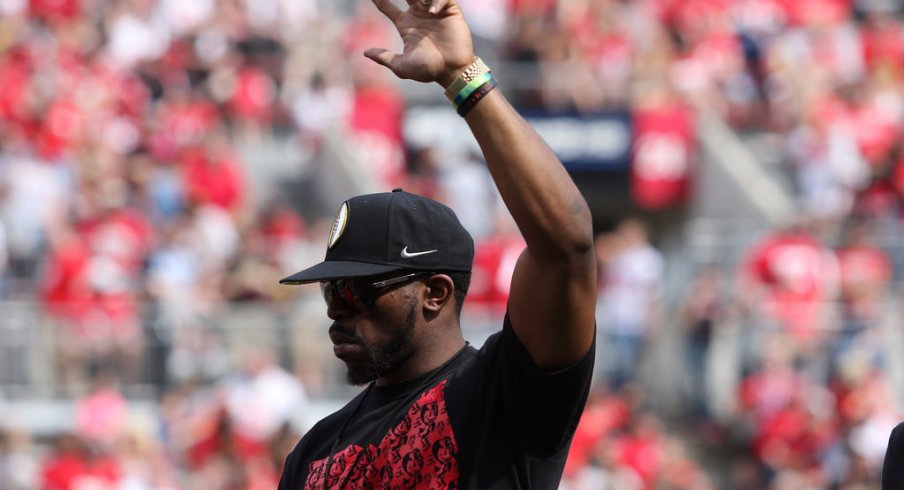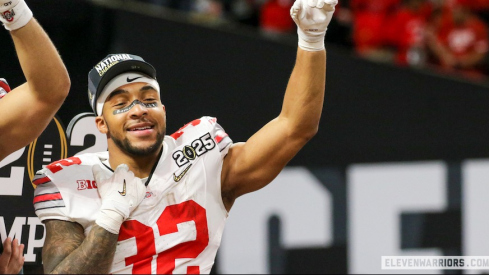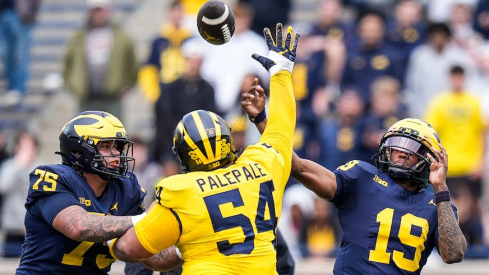Doran Grant, after four years as a Buckeye, is going to be selected in the 2015 NFL draft. He will likely be a third round draft pick, common territory for players who aren't elite talents but have potential to be long-time starters.
For these players, finding the right team is especially important. We know Grant talked to at least three teams: the Detroit Lions, the Carolina Panthers and the Miami Dolphins. When Grant sat down with those teams, I imagine he had his answers to the most typical job interview questions mapped out.
"Tell us about your background."
Doran Grant was a star at St. Vincent-St. Mary High School in Akron, Ohio, playing as a cornerback, a wide receiver, and a kick returner. He was a top-100 player and the third-best cornerback in his class. As a highly-rated player from Northeast Ohio, Grant could explain, it was only natural that he would become a Buckeye; he committed to Ohio State's class of 2011 a month before National Signing Day.
"Tell me about a challenge or conflict you've faced at work, and how you dealt with it."
When Grant arrived in Columbus, the Buckeyes were in turmoil. Head coach Jim Tressel, would resign under pressure in May, and Grant's recruiter (Taver Johnson) would bolt for Arkansas in less than a year.
In his first two seasons, Doran Grant had 25 tackles, one interception, one pass break-up and one fumble recovery. He could have transferred for more playing time, but he stuck it out.
The secondary had a sub-par season in 2013, and there was more turnover as safeties coach/co-defensive coordinator Everett Withers would leave to become the head coach at James Madison. Grant could have coasted or declared for the draft as a junior, but Grant hung tough. Under the direction of cornerbacks coach Kerry Coombs and safeties coach/co-defensive coordinator Chris Ash, the secondary improved enormously – and Grant was its most irreplaceable part, totaling 83 tackles, four interceptions, 11 pass break-ups and a fumble recovery.
"What's a time you exercised leadership?"
This would be a perfect time to bring up Grant's role in his last two seasons. As an upperclassman, Grant often played opposite sophomores and freshmen. As such, he had to exude leadership.
“I feel like verbally, my last two years — junior and senior year — is when I really stepped out of my shell,” Grant told reporters at the NFL Combine. “I always led by example. I always did everything right. But leading more verbally and being that standout guy, my last two years, I think.”
He was indeed a standout guy: as Ohio State's only senior defensive back, Grant earned first-team All-Big Ten honors in 2014.
"What are your greatest professional strengths?"
Doran Grant is an intelligent player, one who gets along with coaches (on Urban Meyer: "He's a great motivator. I love him. I love him for sure.") and does well in aggressive schemes. He isn't easily fooled, and he is good at reading and anticipating screens and other misdirection. He goes after running backs with gusto, and he tackles well.
In short, Grant is a well-rounded prospect. As Grant no doubt brought up during his interviews, teams really like versatile players.
"What is your greatest professional achievement?"
At this point, Grant could (and should) indulge in some bragging. In the Sugar Bowl, he held Alabama's Amari Cooper – widely considered to be a top-five pick – to nine catches for 71 yards, effectively neutralizing Alabama's top weapon. Ohio State would win that game and go on to win the national championship.
In fact, Grant should be especially good at answering this question – he addressed the same topic immediately after the Buckeyes won the Sugar Bowl.
"What do you consider to be some of your weaknesses?"
It's an unavoidable question: here, Grant would have to talk about his size and athleticism.
At 5-foot-10, with 30-1/4" inch arms, Grant is an average-sized cornerback. For reference, Richard Sherman (widely considered the best cornerback in the league) was 6-foot-3 with 32" arms. It's undoubtedly a drawback.
While he may not be able to rebut concerns about his size, Doran Grant can respond to concerns about his athleticism. Grant's official prospect profile said he "lack[s] speed to stick with true vertical threats," but he put the lie to that by running a 4.44 40-yard dash at the NFL Combine. He also displayed a 35-1/2" vertical jump, a 10-foot-5 broad jump, a 7.04 second 20-yard short shuttle and a blazing 4.18 second three-cone drill time.
In other words, Grant could say, he can stick to quick slot receivers with little trouble. As for more physical receivers, he could tell them to ask Amari Cooper if Grant is big enough.
"Is there anything else you'd like for us to take under consideration?"
What else could Doran Grant say? The usual platitudes about wanting to fit in to a team's scheme, of course; everyone needs cornerbacks. But he could also make a final pitch: he's hung on through team crises, he was a vital part of a championship team, he's one of the most intelligent defensive backs they could draft. All in all, that could make Grant one of the first cornerbacks off the board.
Correction: An earlier version of this article misstated the secondary coaches' positions. Kerry Coombs has been the cornerbacks coach since 2012, and was promoted to special teams coordinator in 2013. Chris Ash has been the safeties coach and co-defensive coordinator since 2014.


